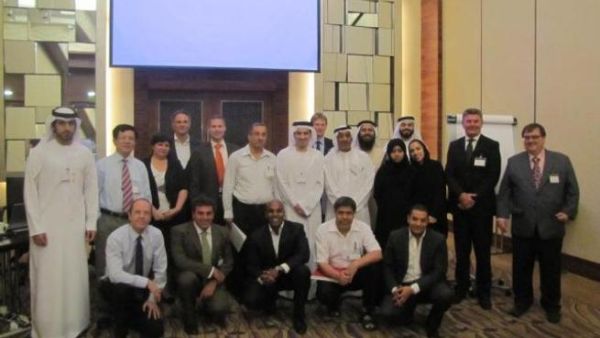DUBAL initiatives feature strongly at DCCE event

Dubai Aluminium Company Limited (DUBAL), the entirely state-owned enterprise whose Jebel Ali complex is home to one of the world's largest single-site primary aluminium smelters, featured strongly at the first consultative event hosted by Dubai Carbon Center of Excellence (DCCE) on behalf of its stakeholders on 17 May 2011. Aiming to showcase the immediate carbon abatement projects currently pursued within the Emirate, the day’s agenda featured eight initiatives, five of which have been implemented by DUBAL.
The event, in compliance with the Clean Development Mechanism (CDM), was held with the assistance and support of the United Nations Development Programme (UNDP). It attracted members of society, the private sector, non-governmental organizations and the media with a common interest in the project-based CDM, whereby activities resulting in reduced greenhouse gas emissions and thus climate change mitigation earn Certified Emission Reduction (CER) credits for each tonne of reduced carbon dioxide (CO2) emission; and the credits can be traded and used to raise funds for new green technologies in developing countries. CDM projects should also improve local/regional conditions through improvement in air quality, work safety, strengthening local industry and economy, sustainable development and energy efficiency. The DCCE currently has a project pipeline with the capacity to reduce annual emissions by more than 1.7 million tonnes CO2, of which approximately 50 per cent were showcased at the meeting.
DUBAL is working closely with DCCE on several CDM projects. Those featured at the event comprised:
Regenerative Burners (RBs) in Melting Furnaces: Five melting furnaces installed in DUBAL’s Casting Operations are conventional cold air burners. Regenerative Burners, where two burners operate in pairs (one is firing while the other exhausts), were installed on one of the melting furnaces for trial purposes; and a fuel saving of between 40 per cent and 50 per cent was achieved. The project will install RBs in the remaining furnaces, with the potential to save 12,500 tonnes of CO2 emissions per year.
D18 Enhancement: By converting DUBAL’s existing D18 Technology Cells using enhanced technologies, the cells operate at higher energy efficiency levels. The total saving of 63 MW equates to 285,850 tonnes of CO2 emission, plus a reduction in perfluorocarbon (PFC) emissions that equates to a reduction of 417,850 tonnes of CO2 emissions per year.
GTX Cogeneration Plant: This project creates an interface between the GT23, the HRSG23 and three of DUBAL’s CCPPs (each comprising two gas turbines, two heat recovery steam generators and one steam turbine) to improve the plant’s overall efficiency by utilizing the additional capacity of the steam turbines generated at peak load (as opposed to base load). The GTX will also interface with DUBAL’s existing Desalination Plant. The improved efficiency will generate carbon savings of about 300,000 tonnes per year.
Absorption Chillers: The existing electric chillers will be replaced with new technology absorption chillers to achieve the most efficient energy and utilities consumption by the system. By reducing power consumption, carbon emissions will be reduced by an estimated 50,000 tonnes per year.
Desalination Plant Energy Optimisation: The aim of this project is to reduce the electrical energy consumption for operating DUBAL’s Desalination Plant (currently about 25 MW) by at least 8 per cent to 10 per cent through optimization of the brine- and sea water pumps. The power savings will yield a reduction in carbon emissions of about 8,030 tonnes per year.






